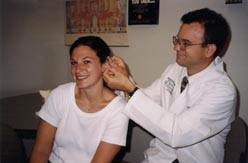Helping them hear what they are missing

Hearing is the last sensory function to leave us when we fall asleep and the first to “come on line” when we awaken. Normal hearing provides vital information about our environment and warnings of danger, affords the opportunity for communication with other people, and opens a channel for the pleasures of listening to music, laughter and sounds in nature.
An estimated 48 million Americans are afflicted with hearing loss and cannot fully appreciate this unique sensory experience. For some, hearing loss is present from birth; for others loss may be due to one or a combination of causes infection, injury, excessive noise exposure, heredity or aging, for example.
Hearing impairment is the most common and widespread form of physical disability in the United States today. It is a “silent” disability, evoking little public recognition and sympathy. The hard of hearing individual usually does not look any different or bear any outward sign of his/her affliction.
Since 1981, the Wisconsin Lions Foundation has been concerned with the impact that hearing loss can have on individuals, families and society. It works to promote awareness of hearing loss, knowledge about prevention, recognition and treatment … and the collection and recycling of used hearing aids for salvage credits, using them to help reduce costs for purchase of hearing aids for the WLF Hearing Project.
The WLF Hearing Project helps Wisconsin’s needy individuals who are hard of hearing, cannot afford to purchase a hearing instrument, and do not qualify for any existing state-funded financial assistance programs. Completion of a detailed Application Form and approval is required; for more information click here.
Its success depends on the collaborative efforts and generosity of Wisconsin Lions, Lioness, and Leo Clubs, hearing healthcare professionals, and hearing aid manufacturers. Lions, Lioness, and Leo Clubs throughout the State collect used hearing aids and provide funding for recipients; hearing professionals (some 100 audiologists statewide) agree to accept reduced fees for their services; and hearing aid manufacturers provide large discounts on hearing devices dispensed to recipients.
